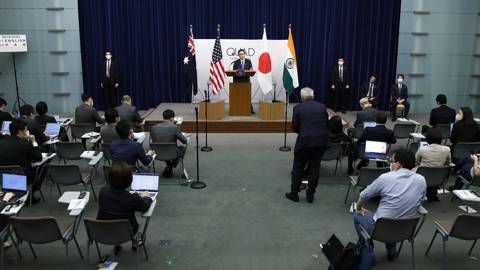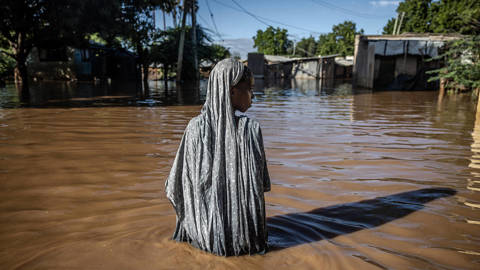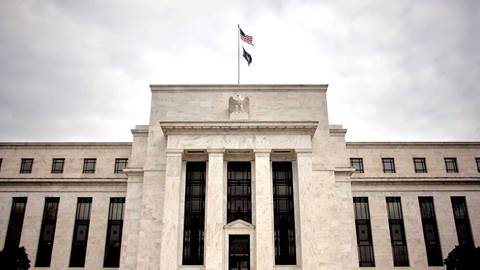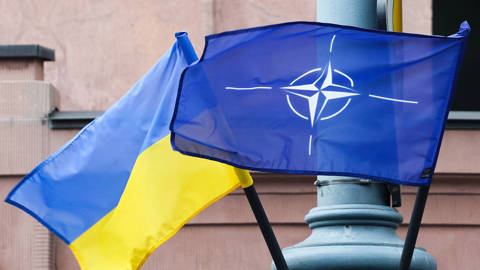Reading the press of late, you might conclude that all Harmid Karzai, Afghanistan's chief, needs to pacify his country is an expanded international peacekeeping presence and faster delivery of aid. The carrot of international assistance and the stick of peacekeeping forces will allegedly prevent Karzai's government from dying in the cradle.
Swayed by this logic, the US has pushed to accelerate delivery of aid--a task it knows well how to achieve, having provided nine-tenths of all emergency relief money to Afghanistan even during the Taliban years. President Bush's announcement that the US, Japan, and Saudi Arabia have created a $180 million fund to reconstruct Afghanistan's trunk highways is the most recent measure to speed up the flow of development assistance.
The international security force, staffed mainly by Turks, is being upgraded and its mandate extended to the entire country. When Paul Wolfowitz, the US Deputy Secretary of Defense, announced this, it represented a reversal of America's earlier position, which favored confining the peacekeeping forces to Kabul lest they get in the way of US operations against Al Qaeda and Taliban diehards.
The trouble with this carrot-and-stick strategy is not that it is wrong but that it is insufficient. It fails to recognize that neither expanded peacekeeping nor efficiently delivered aid will achieve their desired ends until the Afghan public accepts the Karzai government as fairly representing its interests. Today it does not.
The American Revolution can be traced directly to the growing sense among colonists that Parliament's rule in North America was illegitimate. The speed with which debates in the French Estates General evolved into a revolt against the Bourbons reflected the deepening sense among ordinary Frenchmen that Louis XVI's rule lacked legitimacy.
Neither the best-armed government nor the richest can long survive unless broad sections of their population accept its rule as legitimate. Britain failed in America and the French crown failed in France because the governed ceased to recognize their authority. Legitimacy shifted from the regime to its opponents, who soon brought it down.
Something like this is now occurring in Afghanistan. If the causes of this development are not addressed, Karzai's government will inevitably collapse, and with it the entire international process that began a year ago.
Why do Afghans perceive as illegitimate a government put in place by an agreement to which all factions assented, a government that was confirmed by a duly constituted National Assembly (Loya Jirga) held under international patronage? The reason is that Karzai's government, and Karzai himself, are controlled by a small group of powerful men associated with the former Northern Alliance and dominated by Minister of Defense Marshall Fahim.
Foreign commentators often acknowledge that a clique of Tajiks exerts inordinate influence in the government. This understates the government's exclusiveness. Many key figures are from a handful of villages in just one valley, the Panjshir. Pashtuns living in the strategically important south and east, together with Shi'a Muslim Hezaras, constitute some two-thirds of Afghanistan's population. Neither group feels adequately represented in Karzai's councils.
Many Uzbeks, Turkmens, and even some Tajiks, feel excluded. Every politically active person in the country understands the reality of this power grab. They know that Fahim used the Loya Jirga to promote Karzai, a Pashtun, because he was malleable and without independent forces of his own. They tremble at the fact that Marshall Fahim's army, the country's largest, sits in garrisons ringing Kabul. They are frustrated at the international community's blindness to their fate.
This frustration, and Fahim's efforts to suppress it, lies at the heart of many of the recent bloody events now blamed on Taliban die-hards, uncooperative local warlords, and Al Qaeda. Many dissenting Pashtuns did back the Taliban, mostly because it promised to bring peace and order. Many warlords are indeed carrying on their struggle, often with foreign (and even American) backing. Al Qaeda, too, has an interest in crippling Karzai's government and is happy to exploit its Achilles heel.
The only way to resist these threats is to address their root cause: the imbalance of power at the top of the regime and within ministry staffs that is gradually robbing Karzai's government of legitimacy. The fact that Karzai is decent and well intentioned does not alleviate his problem, which he is incapable of addressing alone.
The solution must be to use firmness backed, if necessary, by military strength, to enable Karzai to face down Marshall Fahim. Now that the international peacekeeping force is to operate nationally, Marshall Fahim must be told to lift his stranglehold on Kabul. Now that aid is beginning to flow, Karzai must be told that its continuation is contingent on his bringing prominent Pashtuns and Hezaras into the inner circles of government.
The US and UN are both acting on the basis of a naïve hope that Karzai's legitimacy problem can somehow be "finessed." They are misjudging the seriousness of the situation. If action is not taken soon, Karzai will not survive. The next government would likely be anti-UN, anti-western, anti-American, and anti-secular--and form its political and strategic alliances accordingly. Of course, a new government may not emerge at all. Either way, unless decisive measures are taken within weeks or at most months, Afghanistan will be on its way to yet another round of bloody conflict.










Reading the press of late, you might conclude that all Harmid Karzai, Afghanistan's chief, needs to pacify his country is an expanded international peacekeeping presence and faster delivery of aid. The carrot of international assistance and the stick of peacekeeping forces will allegedly prevent Karzai's government from dying in the cradle.
Swayed by this logic, the US has pushed to accelerate delivery of aid--a task it knows well how to achieve, having provided nine-tenths of all emergency relief money to Afghanistan even during the Taliban years. President Bush's announcement that the US, Japan, and Saudi Arabia have created a $180 million fund to reconstruct Afghanistan's trunk highways is the most recent measure to speed up the flow of development assistance.
The international security force, staffed mainly by Turks, is being upgraded and its mandate extended to the entire country. When Paul Wolfowitz, the US Deputy Secretary of Defense, announced this, it represented a reversal of America's earlier position, which favored confining the peacekeeping forces to Kabul lest they get in the way of US operations against Al Qaeda and Taliban diehards.
The trouble with this carrot-and-stick strategy is not that it is wrong but that it is insufficient. It fails to recognize that neither expanded peacekeeping nor efficiently delivered aid will achieve their desired ends until the Afghan public accepts the Karzai government as fairly representing its interests. Today it does not.
The American Revolution can be traced directly to the growing sense among colonists that Parliament's rule in North America was illegitimate. The speed with which debates in the French Estates General evolved into a revolt against the Bourbons reflected the deepening sense among ordinary Frenchmen that Louis XVI's rule lacked legitimacy.
Neither the best-armed government nor the richest can long survive unless broad sections of their population accept its rule as legitimate. Britain failed in America and the French crown failed in France because the governed ceased to recognize their authority. Legitimacy shifted from the regime to its opponents, who soon brought it down.
SPRING SALE: Save 40% on all new Digital or Digital Plus subscriptions
Subscribe now to gain greater access to Project Syndicate – including every commentary and our entire On Point suite of subscriber-exclusive content – starting at just $49.99.
Subscribe Now
Something like this is now occurring in Afghanistan. If the causes of this development are not addressed, Karzai's government will inevitably collapse, and with it the entire international process that began a year ago.
Why do Afghans perceive as illegitimate a government put in place by an agreement to which all factions assented, a government that was confirmed by a duly constituted National Assembly (Loya Jirga) held under international patronage? The reason is that Karzai's government, and Karzai himself, are controlled by a small group of powerful men associated with the former Northern Alliance and dominated by Minister of Defense Marshall Fahim.
Foreign commentators often acknowledge that a clique of Tajiks exerts inordinate influence in the government. This understates the government's exclusiveness. Many key figures are from a handful of villages in just one valley, the Panjshir. Pashtuns living in the strategically important south and east, together with Shi'a Muslim Hezaras, constitute some two-thirds of Afghanistan's population. Neither group feels adequately represented in Karzai's councils.
Many Uzbeks, Turkmens, and even some Tajiks, feel excluded. Every politically active person in the country understands the reality of this power grab. They know that Fahim used the Loya Jirga to promote Karzai, a Pashtun, because he was malleable and without independent forces of his own. They tremble at the fact that Marshall Fahim's army, the country's largest, sits in garrisons ringing Kabul. They are frustrated at the international community's blindness to their fate.
This frustration, and Fahim's efforts to suppress it, lies at the heart of many of the recent bloody events now blamed on Taliban die-hards, uncooperative local warlords, and Al Qaeda. Many dissenting Pashtuns did back the Taliban, mostly because it promised to bring peace and order. Many warlords are indeed carrying on their struggle, often with foreign (and even American) backing. Al Qaeda, too, has an interest in crippling Karzai's government and is happy to exploit its Achilles heel.
The only way to resist these threats is to address their root cause: the imbalance of power at the top of the regime and within ministry staffs that is gradually robbing Karzai's government of legitimacy. The fact that Karzai is decent and well intentioned does not alleviate his problem, which he is incapable of addressing alone.
The solution must be to use firmness backed, if necessary, by military strength, to enable Karzai to face down Marshall Fahim. Now that the international peacekeeping force is to operate nationally, Marshall Fahim must be told to lift his stranglehold on Kabul. Now that aid is beginning to flow, Karzai must be told that its continuation is contingent on his bringing prominent Pashtuns and Hezaras into the inner circles of government.
The US and UN are both acting on the basis of a naïve hope that Karzai's legitimacy problem can somehow be "finessed." They are misjudging the seriousness of the situation. If action is not taken soon, Karzai will not survive. The next government would likely be anti-UN, anti-western, anti-American, and anti-secular--and form its political and strategic alliances accordingly. Of course, a new government may not emerge at all. Either way, unless decisive measures are taken within weeks or at most months, Afghanistan will be on its way to yet another round of bloody conflict.